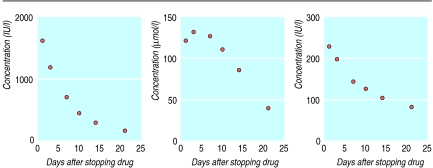Non-steroidal anti-inflammatory drugs, particularly diclofenac sodium, have been associated with serious hepatotoxicity.1 Recently, cyclo-oxygenase-2 selective non-steroidal anti-inflammatory drug inhibitors have become popular for the treatment of arthritic conditions, mainly because of their safer profile for gastrointestinal side effects.2 Celecoxib (Celebrex; Searle) is one such drug, licensed for the treatment of rheumatoid arthritis and osteoarthritis. We report a case of serious hepatotoxicity associated with celecoxib.
A 54 year old woman developed sacroiliac pain. She consulted her general practitioner, who prescribed celecoxib 200 mg daily. After four days her pain resolved and she developed generalised pruritus. When celecoxib was discontinued the pruritus resolved.
A week later the pain returned and celecoxib was restarted. Two days later the patient developed dark urine and increasing pruritus. Five days later she developed jaundice, and blood tests showed an aspartate transaminase concentration of 1650 IU/l (reference range 10-40 IU/l), alkaline phosphatase 232 IU/l (25-115 IU/l), and bilirubin 123 μmol/l (5-20 μmol/l). She was also taking isphagula husk (Fybogel; Reckitt and Colman) and alverine citrate (Spasmonal; Norgine), which she had taken for many months, and hormone replacement therapy (six monthly implants of oestradiol with 100 mg of testosterone), which she had received for four years. She was referred to us for further management.
She had no risk factors for viral hepatitis, and examination was normal apart from noticeable icterus. All drugs were withdrawn and relevant blood tests were performed. We excluded viral and autoimmune hepatitis by blood tests. Her eosinophil count was raised at 0.8×106/l. A hepatic ultrasonogram appeared normal.
On withdrawal of celecoxib her liver function tests improved (figure) and her symptoms resolved. The temporal relation between ingestion of the drug and hepatotoxicity strongly suggested an association between celecoxib and liver damage. A yellow card was submitted to the Committee on Safety of Medicines.
In a review of controlled clinical trials involving 7400 patients, hepatic dysfunction occurred in 0.8% of those treated with celecoxib compared with 0.9% treated with placebo and 3.7% treated with diclofenac sodium. No patient treated with celecoxib, however, had increases of alkaline phosphatase concentrations greater than eight times normal.3
Nimesulide, another non-steroidal anti-inflammatory drug with cyclo-oxygenase-2 selectivity, has been reported to cause fulminant hepatic failure,4 and celecoxib has been associated with hepatitis and pancreatitis.5 To our knowledge severe cholestatic hepatitis has not been reported in association with celecoxib.
Physicians should be aware that, despite a better safety profile for gastrointestinal side effects than conventional non-steroidal anti-inflammatory drugs, celecoxib may still be associated with severe hepatotoxicity. Celecoxib should be stopped if the results of liver function tests are abnormal.
Figure.
Concentrations of serum aspartate transaminase (left), bilirubin (centre), and alkaline phosphatase (right) after celecoxib was stopped
Footnotes
Competing interests: None declared.
References
- 1.Iveson TJ, Ryley NG, Kelly PM, Trowell JM, McGee JO, Chapman RW. Diclofenac associated hepatitis. J Hepatol. 1990;10:85–89. doi: 10.1016/0168-8278(90)90077-5. [DOI] [PubMed] [Google Scholar]
- 2.Silverstein FE, Faich G, Goldstein JL, Simon LS, Pincus T, Whelton A, et al. Gastrointestinal toxicity with celecoxib vs nonsteroidal anti-inflammatory drugs for osteoarthritis and rheumatoid arthritis: the CLASS study: a randomized controlled trial. Celecoxib long-term arthritis safety study. JAMA. 2000;284:1247–1255. doi: 10.1001/jama.284.10.1247. [DOI] [PubMed] [Google Scholar]
- 3.Maddrey WC, Maurath CJ, Verburg KM, Geis GS. The hepatic safety of and tolerability of the novel cyclooxygenase-2 inhibitor celecoxib. Am J Ther. 2000;7:153–158. doi: 10.1097/00045391-200007030-00003. [DOI] [PubMed] [Google Scholar]
- 4.McCormick PA, Kennedy F, Curry M, Traynor O. COX-2 inhibitor and fulminant hepatic failure. Lancet. 1999;352:353. doi: 10.1016/s0140-6736(05)74867-4. [DOI] [PubMed] [Google Scholar]
- 5.Carrillo-Jimenez R, Nurnberger M. Celecoxib-induced acute pancreatitis and hepatitis. Arch Intern Med. 2000;170:553–554. doi: 10.1001/archinte.160.4.553. [DOI] [PubMed] [Google Scholar]



